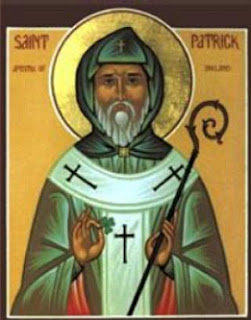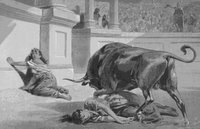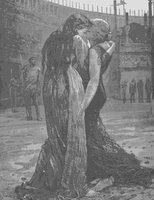The sharp-eyed Mrs. Vark spotted this obituary — painfully short and disturbingly honest:
 Dewayne C. Eckhoff, 67, of Kansas City, KS, died Friday, March 23, 2007 at KU Medical Center. An Agnostic Infidel gone to a place he didn't believe exists.
Dewayne C. Eckhoff, 67, of Kansas City, KS, died Friday, March 23, 2007 at KU Medical Center. An Agnostic Infidel gone to a place he didn't believe exists.Dewayne was born November 21, 1939 in Sutherland, NE to Carl and Jessie Eckhoff. He graduated from Hershey High School in 1958 and the University of Nebraska with a B.S. degree in 1964. He received his Master's Degree from the University of Iowa at Cedar Falls in 1968 and his Pharmacy Degree from the University of Kansas at Lawrence in 1983. He was a long time chemistry teacher at Kansas City Kansas Community College and a part-time pharmacist in Kansas City.
Survivors include 2 sisters, Barbara (Terry) Bannister and Jane (Steve) Long; and a brother, Richard Eckhoff.
As Christians, shouldn't this should pain us in several ways? Dewayne apparently died outside of Christ's Church. Without saving faith in Jesus Christ, God's Word promises man nothing but eternal torment. Paradise has been robbed of another lost sheep who wouldn't hearken to the Shepherd's voice.
Then, can we begin to imagine the hurt lying in the hearts of his family? I seriously doubt that brothers and sisters could make this their final corporate statement concerning a departed sibling unless they'd long expressed these same concerns before the death. Yet even if they had been diligently confessing Christ and witnessing to His presence in their lives for many years, how can they not, if they loved him at all, avoid some feelings of guilt along with the pain of the loss?
Some of us may have already lost family members who died in a Dewayne-like state of disbelief. Others carry the burden of trying to reach living atheistic, agnostic, or false-believing relatives before it's too late. Our prayers will effect nothing for the Dewaynes who've left this vale of sorrows for an even greater eternal woe. However, we can — and should — redouble our prayers on behalf of those unbelievers still living among us while also asking that the Lord would support and guide their families and friends who continue working and hoping to see them converted and saved for eternal life.
I also wonder about those others whom Dewayne left behind. When I read the online obit, three friends had signed the guest book. Does any of them share the apparent faith and accompanying thoughts of the three siblings? I doubt it, since "nil nisi bonum" prevails in their brief entries. One said, "Dewayne was a good guy." Another remarked, "He deserved better." The final entrants, commenting on shared travels, said, "We ... enjoyed his company." All seem blissfully unaware that, unfortunately, some "nice guys" do finish dead last.
When I die, I pray that I leave a legacy at least a bit more hopeful. I want my remaining family and friends to be able to say, "We're sure he's with the Lord ... even if he doesn't deserve it."
Illustration created by the Tombstone Generator.
Technorati Tags: death | dying | unbelief | agnosticism | atheism | judgment | hell | Christianity | evangelism | witness | Jesus | Jesus Christ | Christ | hope | salvation | Gospel | eternal life
Thanks to seminarist Jay Winters, who presents Lutheran Carnival XLVI: Lutherade. Here you can not only read some of the best recent Lutheran blogging but also find out more about Gatorade inventor and Lutheran layman Robert Cade.
Also, this is your first
Please be ready to submit your own work or suggest that of other confessional Lutherans, according the the general submission guidelines. Again, note that I encourage 3rd party submissions of good posts from those whose humility (or absent-mindedness) precludes self-submission.
Technorati Tags: Lutheran Carnival | blog carnival | Lutheran | confessional Lutheran | Jay Winters | Gatorade
 Luke 1:26-38 tells us how the angel Gabriel announced to Mary of Nazareth that she had been chosen to be the mother of the Christ and her response. Mary, a virgin pledged to marry Joseph, briefly wondered how this could be, since she had not had sex with any man. Once Gabriel told her that the Child was conceived by the Holy Spirit, she humbly accepted this sacred obligation: "Behold, I am the servant of the Lord; let it be to me according to your word. (v. 38)" Nothing prevents us from supposing that Our Lord was conceived immediately after this. Since the Church from early days observed 25 March as the date of the Annunciation, the celebration of the Christ's Nativity is observed on 25 December, nine months later.
Luke 1:26-38 tells us how the angel Gabriel announced to Mary of Nazareth that she had been chosen to be the mother of the Christ and her response. Mary, a virgin pledged to marry Joseph, briefly wondered how this could be, since she had not had sex with any man. Once Gabriel told her that the Child was conceived by the Holy Spirit, she humbly accepted this sacred obligation: "Behold, I am the servant of the Lord; let it be to me according to your word. (v. 38)" Nothing prevents us from supposing that Our Lord was conceived immediately after this. Since the Church from early days observed 25 March as the date of the Annunciation, the celebration of the Christ's Nativity is observed on 25 December, nine months later.For centuries in vast parts of Europe, 25 March also marked the change to the new year. While it seems somewhat odd and abrupt to change years in the middle of a month, we can imagine that those accustomed to that calendar easily made the adjustment. Furthermore, they could take to heart the reminder that God's chosen time, that most special time when He sent His Son into human flesh, merited such a "strange" circumstance.
Even though the Visitation of Mary to her cousin Elizabeth took place six months later (see Luke 1:39-56), as Elizabeth neared the end of her own pregnancy with the child who would grow to become John the Baptizer, Mary's song of celebration at that time is also appropriate to remember on the Feast of the Annunciation. In the Magnificat (Luke 1:46-55) the virgin mother of God celebrated God's gift to her, to Israel, and to all people.
Martin Luther wrote a commentary on this canticle. About verse 49, he said, "The 'great things' are nothing less than that she became the Mother of God, in which work so many and such great good things are bestowed upon her as pass man's understanding. For on this there follows all honor, all blessedness, and her unique place in the whole of mankind, among whom she has no equal, namely, that she had a child by the Father in Heaven, and such a child.
"She herself is unable to find a name for this work, it is too exceedingly great; all she can do is break out in the fervent cry: 'They are great things,' impossible to describe or define. Hence men have crowded all her glory into a single word, calling her the Mother of God.
"No one can say anything greater of her or to her, though he had as many tongues as there are leaves on the trees, or grass in the fields, or stars in the sky, or sand by the sea. It needs to be pondered in the heart, what it means to be the Mother of God."
Lection
Psalm 45:7-17
Isaiah 7:10-14
Hebrews 10:4-10
Luke 1:26-38
Collect
O Lord, as we have known the incarnation of Your Son Jesus Christ by the message of the angel to the virgin Mary, so by His cross and Passion bring us to the glory of His resurrection; through the same Jesus Christ, our Lord, who lives and reigns with You and the Holy Spirit, one God, now and forever.
Luther quote from Luther's Works, Vol. 21, p. 326, ed. Jaroslav Pelikan, Concordia Publishing House © 1956.
Technorati Tags: Annunciation | Virgin Mary | Gabriel | mother of God | Theotokos | Luke 1:25-38 | life
 All that we know of Saint Joseph we learn from the first two chapters of Matthew and of Luke. Otherwise he is mentioned only in passing (see Luke 3:23; John 1:45; John 6:42) as the supposed father of Jesus of Nazareth.
All that we know of Saint Joseph we learn from the first two chapters of Matthew and of Luke. Otherwise he is mentioned only in passing (see Luke 3:23; John 1:45; John 6:42) as the supposed father of Jesus of Nazareth.Matthew shows Joseph's compassion for his betrothed wife: When the Virgin Mary revealed her pregnancy to him he sought to avoid a public rebuke, which may have resulted in her being stoned. Then after the Lord sent His angel and revealed Himself as the cause of this extraordinary circumstance, Joseph submitted to God's will, just as had his wife.
 The Heavenly Father thus graciously allowed this unassuming man to bear the responsibility of protecting and providing for the Incarnate Word and the Theotokos. How could Joseph possibly have imagined the extraordinary events that awaited them, including the visits of shepherds and wise men, as well as Herod's wrath and their subsequent flight to Egypt?
The Heavenly Father thus graciously allowed this unassuming man to bear the responsibility of protecting and providing for the Incarnate Word and the Theotokos. How could Joseph possibly have imagined the extraordinary events that awaited them, including the visits of shepherds and wise men, as well as Herod's wrath and their subsequent flight to Egypt?Joseph was a pious Jew, a descendant of David, and a carpenter by trade. (The Gospels use the Greek word tekton, which may be translated "builder" or "architect.") Some scholars suggest that he may have been a mason, a metalworker, or a building contractor.
Because of the silence of the Gospels — and because Jesus entrusted Mary to the care of John — it is generally believed that Joseph died a natural death after the visit to Jerusalem when Jesus was twelve (Luke 2:41-51) but before His baptism (Matthew 3:13-17), probably around His thirtieth year. We can only wonder what influence Jesus' earthly father had on Him during His early years on earth.
Lection
Psalm 127
2 Samuel 7:4-16
Romans 4:13-18
Matthew 2:13-15, 19-23
Collect
Almighty God, from the house of Your servant David You raised up Joseph to be the guardian of Your incarnate Son and the husband of His mother, Mary. Grant us grace to follow the example of this faithful workman in heeding Your counsel and obeying Your commands; through Jesus Christ, our Lord, who lives and reigns with You and the Holy Spirit, one God, now and forever.
Technorati Tags: Joseph | Saint Joseph | Saint Joseph, Guardian of Our Lord | Saint Mary | Theotokos | Jesus | Jesus Christ | Christ | Nazareth | Church Year | liturgical calendar | Christianity | Christian feasts | biography | hagiography | historical theology | Church history | Bible history | New Testament | Gospel
 Patrick (Padraig), one of the best-known missionary saints, was born to a Christian family in southwest Britain around the year 389. While he was a teenager, raiders captured and took him to Ireland. There, he was forced to serve as a herdsman.
Patrick (Padraig), one of the best-known missionary saints, was born to a Christian family in southwest Britain around the year 389. While he was a teenager, raiders captured and took him to Ireland. There, he was forced to serve as a herdsman.After six years he escaped and found his way, home, and then traveled to a monastery community in France. Imagine the surprise of those who knew him — even by his own reckoning, he left Britain as one who cared little for God.
With his new trust in the Lord, Patrick threw himself wholeheartedly into monastic life. Ordained a bishop in 432, he made his way back to Ireland, where he spent the rest of his long life spreading the Gospel and organizing Christian communities.
He staunchly defended the doctrine of the Holy Trinity during a time when it was not popular to do so. His writings include his autobiography, Confessio, and several prayers and hymns still used in the church today.
 Patrick died around the year 466. Many people attribute the Lorica (see below) to him. One of the symbols used for Patrick in ecclesiastical art is a red Cross Saltire on a white background. This was added to the overlaid crosses of Saint George and Saint Andrew to form the current Union Jack of the United Kingdom.
Patrick died around the year 466. Many people attribute the Lorica (see below) to him. One of the symbols used for Patrick in ecclesiastical art is a red Cross Saltire on a white background. This was added to the overlaid crosses of Saint George and Saint Andrew to form the current Union Jack of the United Kingdom.The legendary account of Patrick driving snakes off of the Emerald Isle is just that — a legend. There's no evidence that snakes ever slithered across Irish soil. Much more likely is the story that he used the shamrock or some other type of clover to roughly illustrate the Holy Trinity to the unconverted folk of Ireland.
If he were to return to earth in present day, one can only imagine the disdain with which this hero of the faith would view the drunken celebrations in many places which are held to "honor" his memory.
Lection
Psalm 97:1-2,7-12 or 96:1-7
1 Thessalonians 2:2b-12
Matthew 28:16-20
Collect
Almighty God, in Your providence You chose your servant Patrick to be the apostle of the Irish people, to bring those who wandered in darkness and error to the true light and knowledge of You; grant us so to walk in that light, that we may come at last to the light of everlasting life; through Jesus Christ our Lord, who lives and reigns with You and the Holy Spirit, one God, now forever.
The Lorica or Saint Patrick's Breastplate
 I bind unto myself today
I bind unto myself todaythe strong Name of the Trinity,
by invocation of the same,
the Three in One, and One in Three.
I bind this day to me forever,
by power of faith, Christ's Incarnation;
his baptism in the Jordan river;
his death on cross for my salvation;
his bursting from the spiced tomb;
his riding up he heavenly way;
his coming at the day of doom:
I bind unto myself today.
I bind unto myself the power
of the great love of cherubim;
the sweet "Well done" in judgement hour;
the service of the seraphim;
confessors' faith, apostles' word,
the patriarchs' prayers, the prophets' scrolls;
all good deeds done unto the Lord,
and purity of virgin souls.
I bind unto myself today
the virtues of the starlit heaven,
the glorious sun's life-giving ray,
the whiteness of the moon at even,
the flashing of the lightning free,
the whirling wind's tempestuous shocks,
the stable earth, the deep salt sea,
around the old eternal rocks.
I bind unto myself today
the power of God to hold and lead,
his eye to watch, his might to stay,
his ear to hearken to my need;
the wisdom of my God to teach,
his hand to guide, his shield to ward;
the word of God to give me speech,
his heavenly host to be my guard.
Against the demon snares of sin,
the vice that gives temptation force,
the natural lusts that war within,
the hostile men that mar my course;
of few or many, far or nigh,
in every place, and in all hours
against their fierce hostility,
I bind to me these holy powers.
Against all Satan's spells and wiles,
against false words of heresy,
against the knowledge that defiles
against the heart's idolatry,
against the wizard's evil craft,
against the death-wound and the burning
the choking wave and poisoned shaft,
protect me, Christ, till thy returning.
Christ be with me, Christ within me,
Christ behind me, Christ before me,
Christ beside me, Christ to win me,
Christ to comfort and restore me,
Christ beneath me, Christ above me,
Christ in quiet, Christ in danger,
Christ in hearts of all that love me,
Christ in mouth of friend and stranger.
I bind unto myself the Name,
the strong Name of the Trinity,
by invocation of the same,
the Three in One, and One in Three.
Of whom all nature hath creation,
eternal Father, Spirit, Word:
praise to the Lord of my salvation,
salvation is of Christ the Lord.
Translation by Cecil Francis Alexander
Technorati Tags: Saint Patrick | St. Patrick | Patrick | Saint Patrick of Ireland | Saint Padraig | St. Padraig | Padraig | Saint Padraig of Ireland | St. Patrick's Day | Saint Patrick's Day | Ireland | Trinity | Triune God | Saint Patrick's Breastplate | St. Patrick's Breastplate | Lorica | shamrock | snakes | Church Year | liturgical calendar | Christian | commemorations | biography | hagiography | historical theology | Church history | Irish history | British history | British Isles | United Kingdom
"Bad" Carol Rutz hosts the current Lutheran Carnival of Blogs at her own little corner of the universe, <bad carol!>Carol Rutz’s Annexe</bad carol!>
Lutheran Carnival XLV: What the Frell Edition introduces the reader to several interesting, entertaining, and (at times) thought-provoking posts from members of the confessional Lutheran blogosphere. Pop some corn, pour a drink, watch the filmz, and read the thoughts of an interesting cross section of Luther's heirs.
Technorati Tags: Lutheran Carnival | blog carnival | Lutheran | confessional Lutheran | frell

Daylight Saving Time comes earlier and stays later this year. Before going to bed this Saturday night, most of North America will need to set its clocks forward one hour. Computer users should hope that their automatic updates are in place or else manually adjust their boxes' time settings. This is especially important for those wishing to hear Sunday's sermon or partake in the Lord's Supper. Church-skipping golfers are encouraged to ignore this warning, miss their tee times, and (after swearing at the course attendant for not allowing them to start late) renounce playing the game in lieu of faithful church attendance.
Technorati Tags: Daylight Saving Time | DST | clocks | spring forward, fall back | worship | golf | Dali | Salvador Dali | Dali | melting clock | sarcasm
On my way between hither and yon I discovered one of the terrible secrets of the End Times — some children's toys are truly too intense for children.
HT: Sarcastic Lutheran
Technorati Tags: Apocalypse Pony | My Little Pony | religion | Christianity | humor | Four Horsemen | Four Horsemen of the Apocalypse | Revelation | End Times
My favorite movie critic is still gloating over his uniquitudity, even though only one measly percentage point derived from a 12 question online quiz separates him from me.
| Your Personality is Very Rare (ENTP) |
Your personality type is optimistic, curious, enthusiastic, and open. Only about 4% of all people have your personality, including 3% of all women and 5% of all men. You are Extroverted, Intuitive, Thinking, and Perceiving. |
This quiz agrees with the Bloginality survey I took some time ago which also consigned me to the ranks of the ENTP. There are a few times when I fall into the INTP, so I must be conflicted as to whether I should be a party animal or a wallflower. According to TypeLogic, I share the ENTP personality with noted flesh and blood personages Alexander the Great, J. E. B. Stuart, Sir Walter Raleigh, John Adams, Theodore Roosevelt, Thomas Edison, Lewis Carrol, Julia Child, George Carlin, Weird Al Yankovick, Marilyn Vos Savant, and Alfred Hitchcock. Allegedly, fictional characters Mercutio, Horace Rumpole, Lord Peter Wimsey, "Q" (Star Trek — The Next Generation), Bugs Bunny, and Wile E. Coyote also share this trait with me.
Anyway, there are other ways of demonstrating our following a different drummer (or plumber, or whomever else one wishes to trail behind). For example, did anyone else cook today's heart-healthy oatmeal with a few measures of vanilla extract, Tuaca liqueur, and Myers's Rum? Did another soul stir in a bit of cardamom, coriander, nutmeg, ginger, and allspice along with the cinnamon? And was anyone wise enough to sweeten this tasty morsel with honey?
Technorati Tags: personality quiz | personality | ENTP | Luther at the Movies | cooking | Tuaca | Myers's Rum | oatmeal | breakfast
 For the first time in over a month, we have an updated Big Blogroll O' Vark®™©. I doubt that these are the only changes; it seems that each update brings one or more responses concerning adding, deleting, or changing a listing.
For the first time in over a month, we have an updated Big Blogroll O' Vark®™©. I doubt that these are the only changes; it seems that each update brings one or more responses concerning adding, deleting, or changing a listing.Now if you're not sure what to make of the BBOV or wonder about the benefits of being listed and of listing others' blogs, please read the first three links under Aurous Effluence in the sidebar. Those who'd like the Big Blogroll O' Vark®™© can either email me or copy the list from the Alley's source code (click View | Page Source or Control+U in Firefox or View | Source in Internet Explorer).
New (or Recycled) Kids on the Block
As is my custom, I'll introduce the new enrollees in alphabetical order. Therefore, first in line (and also longest waiting since the previous update) is The Children of God, a thoughtful look at life and Lutheranism through the eyes of Emily, the wife of an LCMS pastor.
Another member of the fair sex is our next new play pal. Please welcome Hoffman Homemaker, a labor of love from Melynda Hoffman.
Now we come across a bit of a conundrum: How is it possible that we have not one, but two Twenty-first Century incarnations of the long-deceased Dr. Martin Luther? Unbelievable as that may seem, Dr. Luther in the 21st Century and his faithful sidekick Forty-two (a Douglas Adams fan?) bring you Lutherama even as you continue to enjoy the antics of the aforementioned reformer through Luther at the Movies.
It pleases me to discover that the Lutheran Enigma has finally joined his spouse in the ranks of confessional Lutheran bloggers. Please, then, give a shout-out to Pastor Gary Gehlbach.
The Rapp Files stand next in line for official introduction. No, these are not the bootleg recordings of a stuttering hip-hop star. No, E. Rapp is "a Lutheran layman, technical writer, amateur musician, recovering Methodist, and exiled buckeye residing in Detroit, Michigan."
Now you get to meet Satis Est: A Confessional Lutheran in the ELCA. Need I say more?
Looks like Dr. Luther ain't the only one who's "back from the dead." I was quite happy to receive an email from Michael Schuermann telling me that he's back in business once again. Since he's also busy at seminary, I pray that he'll be a good blogger and not get his tail in a crack with his online expressions.
Obviously, this Aardvark has no particular problem with well-mannered Lutheran bloggers remaining anonymous. Therefore, I gladly introduce The Unknown Lutheran (Der Unbekannter Lutheraner) to you and encourage your patronage of his site.
With a nod to This Is Spinal Tap, I conclude the presentation of the new arrivals with Volume 11, "because a maximum volume of 10 is just not enough."
This Neighbor Moved Across the Street ...
Adam Roe recently wrote to tell me that while the URL remains the same, he's renamed Working Out My Salvation to The Wittenberg Catholic.
and This Neighbor Moved Out
Finally, we bid adieu to Sword of Gustavus, whose busy life interferes with quality blogging.
For these and all others enrolled in the BBOV, links back are certainly appreciated. And don't forget that all of those listed benefit when you use the entire blogroll. Also, if you'd like to graphically point to the Alley and the Big Blogroll O' Vark®™©, you may use the above design from St. Charles Place or one of these blog buttons:
Finally, if you own or know of a Lutheran blog demonstrating a quia confessional subscription and would like me to consider it for inclusion, please leave a comment. And again, for more information about why this stuff benefits confessional Lutheran blogging, morality, and other worthwhile endeavors, please check out the first three links under Aurous Effluence (particularly the first one) in the sidebar.
Technorati Tags: Aardvark Alley | Big Blogroll O' Vark | BBOV | blogroll | blog roll | Lutheran | confessional Lutheran
 At the dawn of the Third Century, Roman emperor Septimus Severus banned conversions to Christianity. Among those disobeying that edict were Vibia Perpetua, a young noblewoman, and her maidservant Felicitas. Both were jailed at Carthage in North Africa along with three fellow Christians, Revocatus and Saturninus, and Saturus, their teacher.
At the dawn of the Third Century, Roman emperor Septimus Severus banned conversions to Christianity. Among those disobeying that edict were Vibia Perpetua, a young noblewoman, and her maidservant Felicitas. Both were jailed at Carthage in North Africa along with three fellow Christians, Revocatus and Saturninus, and Saturus, their teacher.Perpetua and at least some of the others had not completed catechesis and weren't yet baptized when arrested. Evidently, they received Holy Baptism before being taken to prison. She was also a new mother and a fairly recent widow. Felicitas (or Felicity) was near the end of her own pregnancy when arrested.
During their imprisonment, Perpetua and Felicitas witnessed to their faith with such conviction that the officer in charge became a follower of Jesus. For some time, doubts remained about their fates, but Perpetua had a vision of a golden ladder guarded by a fierce dragon. She climbed it, stepping on the dragon's head to do so. At the top, she found a green meadow with many white-robed figures. In their midst stood a Shepherd, who welcomed her and gave her cheese from the sheep's milk. She awoke understanding that martyrdom was assured but that she would triumph.
 Perpetua's father came to plead that she recant her confession of faith and renounce Jesus Christ. This she steadfastly refused.
Perpetua's father came to plead that she recant her confession of faith and renounce Jesus Christ. This she steadfastly refused.Roman law forbade the execution of pregnant women and Felicitas feared that Perpetua and the men being held at the same time would face martyrdom but leave her behind. However, she gave birth two days before the scheduled execution and was allowed to join her companions in the arena on 7 March.
The women first made arrangements for the well-being of their children. This was possible because the imperial decree only concerned recent converts to Christianity (or Judaism). Since those entrusted with their children's care were believers of long standing, they were safe from persecution, at least for the time being.
The accounts say that the five were first scourged at the crowd's urging. Then the men faced a boar, a bear, and a leopard while a wild cow was set against the women. After they were all injured, Perpetua and Felicity exchanged the kiss of peace before the Romans put them to the sword. One tradition holds that Perpetua showed mercy to her captors by guiding the sword of a trembling young gladiator to her own heart because he could not bear to put her to death.
The martyrs were interred in Carthage in North Africa and the story spread throughout Christendom. Later, a basilica was erected over their tomb. The story of the martyrdom of Saint Perpetua, Saint Felicitas, and their faithful companions has served for centuries as encouragement to persecuted Christians.
Lection
Psalm 34:1-8 or 124
Hebrews 10:32-39
Matthew 24:9-14
Collect
O God the true Emperor of Your saints, who strengthened Your servants Perpetua and Felicitas and their companions to make a good confession, staunchly resisting, for the cause of Christ, the claims of human affection, and encouraging one another in their time of trial, grant that we who cherish their blessed memory may share their pure and steadfast faith, and win with them the palm of victory; through Jesus Christ our Lord, who lives and reigns with You and the Holy Spirit, one God, forever and ever.
Technorati Tags: Perpetua | Saint Perpetua | St. Perpetua | Felicitas | Saint Felicitas | St. Felicitas | Felicity | Saint Felicity | St. Felicity | martyr | martyrdom | saint | Church Year | liturgical calendar | Christian | commemorations | biography | hagiography | historical theology | Church history | Carthage
 St. Dewi (also Degui or David), Bishop and Confessor and patron of Wales, is usually represented standing on a little hill, with a dove on his shoulder. From ancient times, the Welsh have worn a leek on St. David's Day, in memory of a battle against the Saxons, at which it is said they wore leeks in their hats, by St. David's advice, to distinguish them from their enemies. The Welsh honor him not only as their patron saint but as special evangelist of their land, just as Patrick holds that honor for Ireland.
St. Dewi (also Degui or David), Bishop and Confessor and patron of Wales, is usually represented standing on a little hill, with a dove on his shoulder. From ancient times, the Welsh have worn a leek on St. David's Day, in memory of a battle against the Saxons, at which it is said they wore leeks in their hats, by St. David's advice, to distinguish them from their enemies. The Welsh honor him not only as their patron saint but as special evangelist of their land, just as Patrick holds that honor for Ireland.The earliest mention of St. David is found in a tenth-century manuscript Of the Annales Cambriae, which assigns his death to AD 601. Many other writers, from Geoffrey of Monmouth down to Father Richard Stanton, hold that he died about 544; their opinion is based solely on data given in various late "lives" of St. David, and there seems no good reason for setting aside the definite statement of the Annales Cambriae, which is now generally accepted.
Speculation that he was born at Henvynyw (Vetus-Menevia) in Cardiganshire is not improbable. He was prominent at the Synod of Brevi (Llandewi Brefi in Cardiganshire). Dewi was active in refuting heresy in Wales and in promoting Nicene Christology and the orthodox Christian faith.
 According to tradition, Saints Dubricius and Deiniol sought him out, calling him to the Synod of Brevi "against the Pelagians." Dewi was with difficulty persuaded to accompany them; preferring the quiet monastic life. However, once he arrived at the Synod, he preached so loudly and so eloquently that all the heretics were confounded. Shortly afterwards, in 569, he presided over another synod held at a place called Lucus Victoriae.
According to tradition, Saints Dubricius and Deiniol sought him out, calling him to the Synod of Brevi "against the Pelagians." Dewi was with difficulty persuaded to accompany them; preferring the quiet monastic life. However, once he arrived at the Synod, he preached so loudly and so eloquently that all the heretics were confounded. Shortly afterwards, in 569, he presided over another synod held at a place called Lucus Victoriae.David is the only one of the four patron saints of the British Isles not to be represented on the British Union Jack flag. The Alley's biography for Saint Andrew touches upon each of these and their respective emblems.
Lection
Psalm 16:5-11 or 96:1-7
1 Thessalonians 2:2b-12
Mark 4:26-29
Collect
Almighty God, who called your servant Dewi to be a faithful and wise steward of your mysteries for the people of Wales, mercifully grant that, following his purity of life and zeal for the gospel of Christ, we may with him receive the crown of everlasting life; through Jesus Christ our Lord, who lives and reigns with you and the Holy Spirit, one God, now and forever.
Technorati Tags: Saint Dewi | St. Dewi | Saint Dewi of Mynyw | Saint Degui | St. Degui | Saint David | St. David | Saint David of Wales | Wales | Mynyw | Dewi | David | Degui | St. David's Day | leek | leeks | Church Year | liturgical calendar | Christian | commemorations | biography | hagiography | historical theology | Church history | Welsh history | British history | British Isles

